|
|
|
Sort Order |
|
|
|
Items / Page
|
|
|
|
|
|
|
| Srl | Item |
| 1 |
ID:
153878
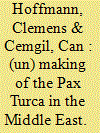

|
|
|
|
|
| Summary/Abstract |
Turkey’s foreign policy activism has received mixed reviews. Some feel threatened by the alleged increasing Islamization of the country’s foreign policy, sometimes called ‘neo-Ottomanism’, which is seen as a significant revision of Turkey’s traditional transatlanticism. Others see Turkey as a stable democratic role model in a troubled region. This debate on Turkish foreign policy (TFP) remains dominated by a sense of confusion about what appear to be stark contradictions that are difficult to make sense of. Intervening in this debate, this article will develop an alternative perspective to existing accounts of Turkey’s new foreign policy. Offering a historical sociological approach to foreign policy analysis, it locates recent transformations in Turkey’s broader strategies of social reproduction. It subsequently argues that, contrary to claims about Turkey’s ‘axis shift‘, its changing foreign policies have in fact never been pro-Western or pro-American. All foreign policy ‘shifts’ and ‘inconsistencies’, we argue, are explicable in terms of historically changing strategies of social reproduction of the Ottoman and Turkish states responding to changing domestic and international conditions.
|
|
|
|
|
|
|
|
|
|
|
|
|
|
|
|
| 2 |
ID:
146779
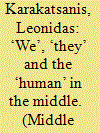

|
|
|
|
|
| Summary/Abstract |
This paper explores the way in which historiography produced in Turkey (or by Turkish scholars abroad) approaches foreign military/diplomatic interventions in the Ottoman Empire during the long nineteenth century. It focuses on three case studies where ‘humanitarian reasons’ formed the discursive basis/justification of such interventions. The author argues that when the distinction between victims and perpetrators, civilians and combatants, emerges as an interpretive dilemma in the debates of the historical period examined, similar interpretive and normative challenges are inherited by the historiographical accounts of it. The paper distinguishes two contrasting ways in which Turkish historiographical scholarship responds to such a dilemma. The first remains confined by the way Ottomans themselves viewed the world around them and uncritically reproduces rigid categories of selfhood and otherhood between ‘us’ and ‘them’. The second trajectory offers tools for understanding the conflicts behind the construction of the category of the human worth of international protection, and disentangles itself from the normative bind described above.
|
|
|
|
|
|
|
|
|
|
|
|
|
|
|
|
| 3 |
ID:
161053


|
|
|
|
|
| Summary/Abstract |
The paper studies the “Turkish model” in a comparative historical perspective from three angles: as an example of mobilization modernization; as a combination of liberal democracy and Islam; and as a de-Westernization paradigm. The focus is on the transformation of the “Turkish model” and its substantive evolution from the early 1990s to the middle of the 2010s, and on how peaks of international interest in the “Turkish model” impacted Ankara’s foreign policy activities and its positioning on the international stage by Turkish elites. This approach helped to identify the factors behind periodic resurgence and transformation of the “Turkish model” and the shifting balance between the expectations of its potential recipients and Ankara’s plans to use it as a foreign-policy tool. Research methodology is based on the theory of multiple modernities and the concept of symbolic interactionism in international relations. In the case of Turkey, this approach provides broader possibilities for interpreting Ankara’s foreign-policy strategies and understanding the mechanisms of its relations with other countries in the Greater Middle East.
|
|
|
|
|
|
|
|
|
|
|
|
|
|
|
|
| 4 |
ID:
169594


|
|
|
|
|
| Summary/Abstract |
The March 31 municipal elections in Turkey produced numerous surprises, as the ruling Justice and Development Party (AKP) suffered losses in the country's three largest cities: Istanbul, Ankara and Izmir. On the other hand, President Recep Tayyip Erdoğan, the powerful leader of the conservative Islamo‐Turkish nationalist movement and himself a former mayor of Istanbul, emerged with a “victory”: 44 percent of the total vote. Its ally, the Nationalist Movement Party (MHP), won 7 percent. Yet, Erdoğan's losses extended well beyond Turkey's three largest cities to include Antalya, Adana, Mersin and many others. The results in Istanbul are symbolic: the president's rise to political power began there. He won the mayoral elections in 1994 with a plurality (barely more than 25 percent), promising to address critical urban infrastructure issues including water, traffic logistics and pollution.
|
|
|
|
|
|
|
|
|
|
|
|
|
|
|
|
| 5 |
ID:
053191
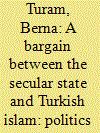

|
|
|
| 6 |
ID:
020534
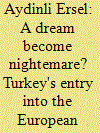

|
|
|
|
|
| Publication |
Nov 2001.
|
| Description |
381-388
|
|
|
|
|
|
|
|
|
|
|
|
|
|
|
|
| 7 |
ID:
129558
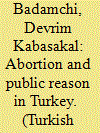

|
|
|
|
|
| Publication |
2014.
|
| Summary/Abstract |
During May and June 2012, the question of abortion was hotly debated in Turkish public forums. This paper analyzes the main characteristics of this abortion debate using John Rawls's conception of public reason as a normative framework. In doing so, speeches and declarations on abortion made by legislators are critically evaluated. The arguments in the debate are examined with a view to interpret how the issue should be discussed as far as the demands of public reason are concerned. From a Rawlsian framework, it is observed that the pro-ban position (Adalet ve Kalk?nma Partisi) is far from contributing to a reasonable balance of political values on abortion whereas the contra-ban position (Cumhuriyet Halk Partisi) satisfies the demands of public reason. Moreover, it is argued that, the latest proposed legislation on abortion cannot be viewed as an outcome of a reasonable balance of political values but is rather an outcome of pragmatic compromise.
|
|
|
|
|
|
|
|
|
|
|
|
|
|
|
|
| 8 |
ID:
102392
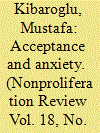

|
|
|
|
|
| Publication |
2011.
|
| Summary/Abstract |
US nuclear weapons have been an important part of Turkey's security strategy since their first deployment on Turkish soil in the early 1960s. Turkey's NATO membership and its close relationship with the United States have been perceived to be integral to maintaining its security. The release of the 2010 US Nuclear Posture Review (NPR), with its focus on disarmament and reduced reliance on nuclear weapons, has a number of potential consequences for Turkey. This article provides background on the history of Turkish-US nuclear weapons policy in light of issues ranging from Middle Eastern politics to the development of NATO's new Strategic Concept. It then describes how actors in the government, military, and academia in Turkey have reacted to the NPR, why they reacted as they did, and how the Obama administration's initiatives may be received in Turkey in the future. This article concludes that both military and civilian actors in Turkey have reacted favorably to the NPR and are pleased by its emphasis on nuclear nonproliferation and the maintenance of extended deterrence; however, there is less agreement in Turkey about the emphasis placed by the NPR on the danger of nuclear terrorism.
|
|
|
|
|
|
|
|
|
|
|
|
|
|
|
|
| 9 |
ID:
053805


|
|
|
| 10 |
ID:
124482


|
|
|
|
|
| Publication |
2013.
|
| Summary/Abstract |
This article explores the political subjectivity of Kurdish children in urban Turkey. Often referred to as "stone-throwing children," since the early 2000s Kurdish children have entered Turkish public discourse as central political actors of the urban Kurdish movement. I suggest that the politicization of children can be understood in the context of transformations in age and kinship systems within the Kurdish community that were shaped by the forced migration of Kurds in the early 1990s. Focusing on the experiences of Kurdish children in the city of Adana, I argue that memories of violence transmitted by displaced parents, combined with the children's experiences of urban life, including exclusion, discrimination, poverty, and state violence, necessitate a reevaluation of how childhood is conceived and experienced within the Kurdish community. In a context where Kurdish adults often have trouble integrating into the urban context, their children frequently challenge conventional power relations within their families as well as within the Kurdish movement. In contrast to a dominant Turkish public discourse positing that these children are being abused by politicized adults, I contend that Kurdish children are active agents who subvert the agendas and norms of not only Turkish but also Kurdish politics. The article analyzes the ways Kurdish children are represented in the public discourse, how they narrate and make sense of their own politicization, and the relationship between the memory and the postmemory of violence in the context of their mobilization.
|
|
|
|
|
|
|
|
|
|
|
|
|
|
|
|
| 11 |
ID:
193143
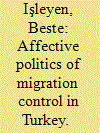

|
|
|
|
|
| Summary/Abstract |
There is an increasing call for addressing the Eurocentrism of research on the external dimension of European Union (EU) migration and border policies and practices. A growing body of work attempts to remedy the discipline’s Eurocentrism through postcolonial theory. This article argues that more needs to be done to unsettle the Eurocentrism of migration studies with regard to the question of non-EU political subjectivity. The article adopts an alternative conception of subjectivity, which looks at the “affective” dimension of international relations. Through a close engagement with postcolonial studies on the question of political subjectivity, the article underscores the significance of history and historical relationships in constituting an affective politics of borders and migration in the non-EU world. The argument is illustrated through an empirical focus on Turkey. Drawing on interviews with Turkish border officials, the article aims to contribute to the literature in two ways. First, it argues that affective attachments shape how Turkish actors perceive and attribute meaning to national borders and human mobility across the national territory. Second, and relatedly, Turkish actors’ identification with and positioning towards the EU’s migration control regime are products of affective attachments rooted in historical experiences and encounters with Europe.
|
|
|
|
|
|
|
|
|
|
|
|
|
|
|
|
| 12 |
ID:
146085


|
|
|
|
|
| Summary/Abstract |
This article is an analysis of Afghan migrants’ journeys to Turkey. The journey is defined as a form of narrative constructed by migrants encompassing long periods of immobility punctuated by shorter instances of travel. This conceptualisation of journey helps transcend the dichotomies associated with the journey such as origin and destination. The article first documents the conditions and nature of irregular travel of Afghan migrants to Turkey focusing particularly on the section of travel between Iran and Turkey. It demonstrates that the arrival of most participants to Turkey had been preceded by non-linear travel that involves uncertainty and long periods of immobility. The article then focuses on the role of journeys in the migration process, specifically as a form of narrative and a space for transformation. The construction of narratives on the journey is also important both as a skill and an agentic action that gives meaning to the migration process as a whole. Finally, the transformative potential of the journeys for participants is illustrated both in terms of the impact of the journey on migration decisions in Turkey and the ability to acquire and demonstrate different skills and autonomy.
|
|
|
|
|
|
|
|
|
|
|
|
|
|
|
|
| 13 |
ID:
179014
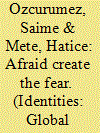

|
|
|
|
|
| Summary/Abstract |
This study investigates the perceptions of the local female population towards displaced Syrians in Turkey. The research is based on the analysis of data from participant observation and discourse analysis of conversations in five ‘gün’ groups, which are informal, social, and fairly regular gatherings of local women, in Mersin in Spring 2018. Five common discursive patterns are identified: stereotyping, biased perceptions, ‘us’ vs. ‘them’, scapegoating, and discrimination. We conclude that local women’s discourses reveal marginalisation and discursive exclusion of displaced Syrians in Turkey, and argue that such othering originates not only from existing cultural differences, language barriers, and lack of trust, but also from lack of sustained social interaction between these groups. Further studies should facilitate both knowledge sharing about the additional vulnerabilities such attitudes create for displaced people and potential paths for meaningful engagement between local community members and forcibly displaced people.
|
|
|
|
|
|
|
|
|
|
|
|
|
|
|
|
| 14 |
ID:
079798
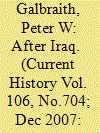

|
|
|
|
|
| Publication |
2007.
|
| Summary/Abstract |
In Iraq itself, the unintended consequences of the war have been worse even than Turkey's alienation and Iran's triumph
|
|
|
|
|
|
|
|
|
|
|
|
|
|
|
|
| 15 |
ID:
163069
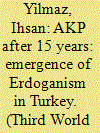

|
|
|
|
|
| Summary/Abstract |
In recent years, several observers of Turkey have recognised a novel development in Turkish politics: the rise of Erdoganism. President Recep Tayyip Erdoğan’s personality and style have come to embody the Turkish nation, the state and its economic, social and political institutions. But what is Erdoganism? What are its main attributes? Is it a mere ideology or the name of the emerging political regime in Turkey? While commentators have provided several observations of Erdoganism, it has not been duly examined on its own in the academic literature. This paper’s main premise is that in Turkey, a new political regime has emerged in recent years which can best be defined as Erdoganism. Erdoganism has four main dimensions: electoral authoritarianism as the electoral system, neopatrimonialism as the economic system, populism as the political strategy and Islamism as the political ideology. We first explain why we think Erdoganism is a better concept to define the emerging political regime in Turkey. We briefly discuss Sultanism, Khomeinism and Kemalism in order to produce a set of references for our discussion of Erdoganism. We then provide a thorough analysis, explaining the ways in which Erdoganism manifests itself through electoral authoritarianism, neopatrimonialism, populism and Islamism.
|
|
|
|
|
|
|
|
|
|
|
|
|
|
|
|
| 16 |
ID:
191927


|
|
|
|
|
| Summary/Abstract |
The turbulence of Turkish domestic politics in 2015–16 coincided with the unraveling of the government's hyperactive policy in Syria and the expansion of Kurdish forces there under the People's Defense Units (YPG). This article argues that, since 2016, Turkey's Syria policy has been transformed into an infinite war against the YPG. This perpetual militarization has created an environment where Turkish domestic politics can be restructured in the name of national security, maximizing presidential power and accelerating the country's slide toward competitive authoritarianism. This process has also reshaped the ruling Justice and Development Party (AKP), which has shifted further toward nationalism and entered into a symbiotic relationship with the military.
|
|
|
|
|
|
|
|
|
|
|
|
|
|
|
|
| 17 |
ID:
120906


|
|
|
|
|
| Publication |
2013.
|
| Summary/Abstract |
This essay reviews and analyzes Albania's connections with the Middle East since the era of Enver Hoxha's rule, when ideology was a strong factor in international relations. Since the end of the Cold War, Albania has been most interested in developing political, economic, and cultural ties, especially with Turkey, Israel, and the Arab states of the Persian Gulf region. Through its modern history, Albania has been a good example of a politically and economically weak state exercising a fairly consistent asymmetric foreign policy based on the support of great powers and their allies.
|
|
|
|
|
|
|
|
|
|
|
|
|
|
|
|
| 18 |
ID:
140702
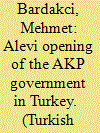

|
|
|
|
|
| Summary/Abstract |
In spite of the favorable climate created with the launch of the Alevi Initiative, which aimed at the settlement of the grievances held by the Alevi community, the Adalet ve Kalkınma Partisi (AKP) government's over-cautious approach not to offend the Sunni-Hanefi segments of the electorate has cost them the trust of the Alevi community. Besides, the weak EU political conditionality and the embedded nature of the Sunni-Hanefi interpretation of Islam in both the state and society, not to mention in the legislation, have deterred the AKP government from achieving a fully fledged settlement to the Alevi issue.
|
|
|
|
|
|
|
|
|
|
|
|
|
|
|
|
| 19 |
ID:
137427
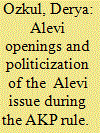

|
|
|
|
|
| Summary/Abstract |
This article reviews recent government efforts to address the “Alevi issue” and identify their successes and failures. It demonstrates that the “Alevi openings” constituted paradoxical processes: tracing various components of the “openings” through news media, it shows that, on one hand, they enabled the “Alevi issue” to be brought to public attention. On the other hand, once Alevis were made more visible in public, non-sympathizers could mobilize their representation for their own ends. These empirical findings have profound theoretical implications. They show that “discursive claims of democratization” at the state level do not necessarily result in democratic mechanisms, which can resolve the demands of a pluralistic civil society. The author argues that what she calls the “tutelary secularism” in Turkey, in other words, the management and disciplining of religious groups, continues under the Justice and Development Party (AKP) rule. This model not only fails, but also produces new sources of conflict in Turkey.
|
|
|
|
|
|
|
|
|
|
|
|
|
|
|
|
| 20 |
ID:
169338
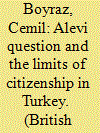

|
|
|
|
|
| Summary/Abstract |
The Alevi question in Turkey is not only about a manifestation of the demands for religious freedoms and pluralism but also an issue of citizenship at least for the last three decades. This article argues that as a result of the rise of the Alevi identity and collective capacity of the Alevis to formulate demands in the national and international public spheres, the issue has increasingly turned to a matter of struggle for the long-denied equal citizenship rights of the Alevis in Turkey. Expected failure of workshops process, namely Alevi Opening, during the second term of the Adalet ve Kalkınma Partisi (AKP) period increasingly brought a sense of the disappointment among the Alevi organizations due to the fact that the issue was not managed with a perspective based on equal citizenship rights but with a discussion on the authenticity and originality of the Alevi demands. Enduring silence for the solution of the Alevi question in the last decade would lead Alevi organizations to the search for the extension of the self-creation of the survival mechanisms without the state support. This paper, within these considerations, is based on the demands of the Alevi society in Turkey and their struggle for the legal recognition, which increasingly challenged the Turkish form of secularism and citizenship regimes today.
|
|
|
|
|
|
|
|
|
|
|
|
|
|
|
|
|
|
|
|
|